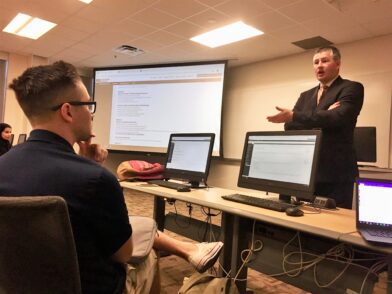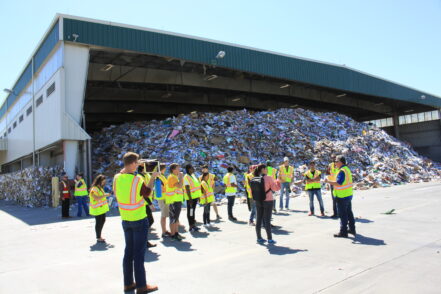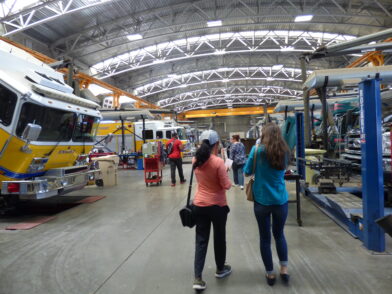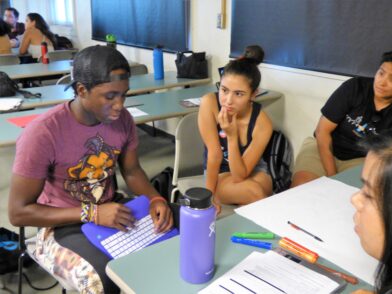The City of Glendale Receives Strategies for Local Sustainability Goals From the Project Cities Program
ASU’s Project Cities program partnered with the City of Glendale, Arizona, during the 2018-2019 academic year to provide assistance in the establishment of sustainability and livability projects, including electrifying municipal vehicles and the creation of a regional recycling program.
Metrics
Community
Glendale, Arizona, USACommunity Size
249,630University
Arizona State UniversityProgram
Project CitiesYears
2018-2019Status
CompletedCase Type
Partnership StoriesRegion
EPA Region 9University Department Code
Environmental and Resource Management, Public Affairs, Sustainability, Technical communication, Urban PlanningSustainable Development Goals
06 Clean Water and Sanitation, 07 Affordable and Clean Energy, 08 Decent Work and Economic Growth, 09 Industry Innovation and Infrastructure, 11 Sustainable Cities and Communities, 12 Responsible Consumption and Production, 13 Climate Action, 14 Life Below Water, 17 Partnerships for the GoalsThe City of Glendale, Arizona, may have once been a small farming town, but it has grown into a bustling city home to a diverse population of approximately 250,000 residents. Known as “Arizona’s Antique Capital,” thanks to its many historic buildings, there is nothing old about the city. Glendale houses popular hubs like the Westgate Entertainment District, Desert Diamond Arena (formerly Gila River Arena), the State Farm Football stadium (home to the Arizona Cardinals), and many other natural and public attractions.
The city is more than entertainment and attractions, though. Thanks to its diverse community, Glendale has a keen awareness of ongoing economic, environmental, and social challenges. From water management to the implementation of regional sustainability practices, municipal officials could use assistance developing and authorizing such plans.
Glendale invited Arizona State University’s (ASU) Project Cities program for the 2018-2019 academic year to support their sustainability and livability initiatives. Project Cities, a member of the EPIC-Network, assists cities by “connecting university students, faculty and academic courses to sustainability projects prioritized by community stakeholders” (Project Cities Mission).
Project Cities partners with the City of Glendale
In need of assistance with their environmental, economic, and social challenges, the City of Glendale invited ASU’s Project Cities to collaborate on local initiatives. The city provided Project Cities faculty and staff with the projects they most needed assistance with, from water management and conservation to requiring sustainable plans for municipal facilities.

Project Cities faculty and staff developed courses which would tackle these very challenges, providing assistance where Glendale city officials needed it most. While the work produced by the students would help the city, first and foremost, the outcomes didn’t stop there.
Steven Russell, program manager of Project Cities, said the program has a multitude of benefits for everyone involved. “The students get a hands-on learning opportunity to practice professional skills by working with clients,” Russell said. “The city gets extra capacity to move projects forward that they may not have the labor or capacity to address at the time and citizens, of course, benefit from having a more economically sustainable community,” he said. (The State Press)
Over the course of the academic year, the students conducted a variety of studies in collaboration with community stakeholders, municipal staff, and ASU faculty. Research included performing surveys with local residents, on-the-ground research in municipal facilities, academic literary research, analysis of related case studies, and much more. Their combined findings accumulated in the production of recommendations and strategies that could help remediate and solve the city’s ongoing challenges.
Courses provide recommendations and strategies to Glendale

During the course of their year-long relationship, students of the Project Cities program assisted the City of Glendale by collaborating on the following projects:
Two courses identified ways for Glendale to expand and improve its electric vehicle program, which has since led to the city introducing electric municipal vehicles, improving public perception around them, and installing dozens of electric charging stations around the city.
Two courses partner with city officials to aid in the renovation of the Glendale’s Field Operations Campus by identifying “best [sustainable construction] practices [as well as] analyzing data to devise cost-effective solutions for this renovation and other municipal buildings” (Project Report).
Sustainable Solid Waste Management students researched pathways for Glendale to implement its own extensive recycling program, from improving public perceptions around recycling to developing intergovernmental arrangements (IGAs) with fellow cities in the region.
Social Media in the Workplace course created a comprehensive social media program and strategy which could help the city better “communicate with their constituencies about city issues, events, and initiatives”(Project Cities: City of Glendale).

Hazardous Waste Management course helped Glendale officials research standards and regulations for Aboveground Storage Tanks (ASTs) not covered by the EPA’s Spill Prevention, Control and Countermeasure (SPCC) requirements. They also devised operations to ensure “tank permits are up-to-date, all operation requirements are met, and thorough inspections are conducted regularly” (Project Poster).
Students from two courses provided strategies and recommendations to engage traditionally excluded communities in city forums and municipal planning, like creating youth engagement committees and hosting “Conversation Cafes” with the dynamic residents of Glendale (Project Posters).
Glendale and Project Cities benefit from their collaboration
The City of Glendale now has a number of viable projects to consider thanks to the work provided by the students of Arizona State University’s Project Cities program. Glendale spokesman Jay Crandall made note of projects like assessing sustainability options for the city’s facility master plan, identifying recommendations to transition to an electric fleet, and developing an above ground chemical storage tank inventory and compliance report will help support the city’s mission to improve local sustainability and livability conditions.

“Working with the students in the respective disciplines has been a very rewarding experience for our individual project managers,” Mr. Crandall said. “The student’s observations have provided some interesting insights and a baseline for advancing strategic initiatives, and has provided the city with the opportunity to engage with students about careers in local government to encourage a pipeline of future talent” (Daily Independent).
The partnership benefits both parts of the partnership greatly: going forward, Glendale can efficiently institute the strategies provided by students to improve conditions for residents and the environment in the region; moreover, students involved in the Project Cities partnership have earned real-world experience that will translate to opportunities outside of college, while the program itself will continue to improve thanks to their partnership with Glendale.
Best of all, the partnership between the City of Glendale and ASU’s Project Cities epitomizes the importance of collaboration between local municipalities and higher-education institutions. By utilizing the expertise of students and faculty, cities can improve quality of life for the residents while having a positive impact on their neighboring communities.








